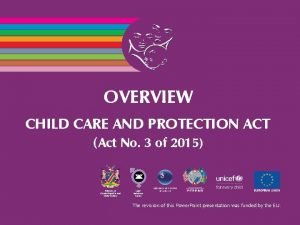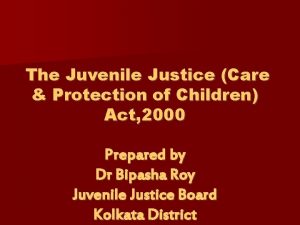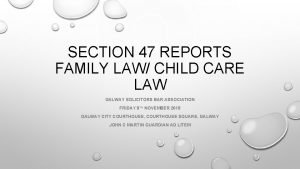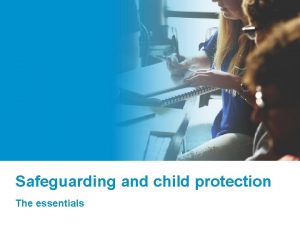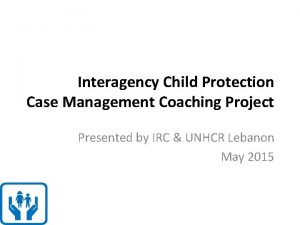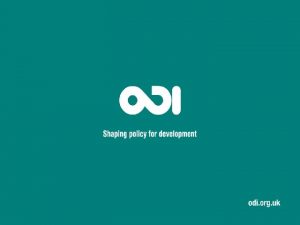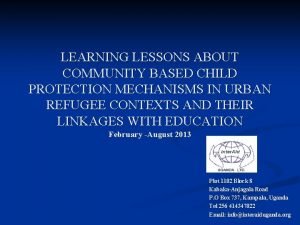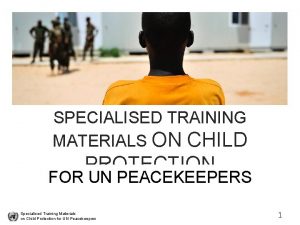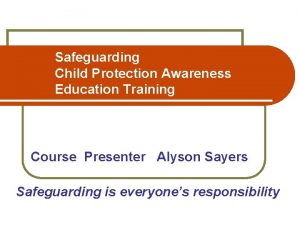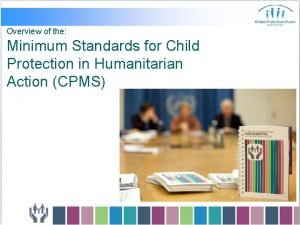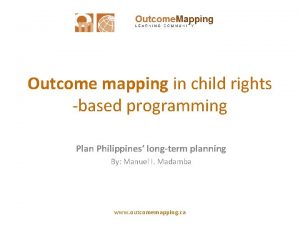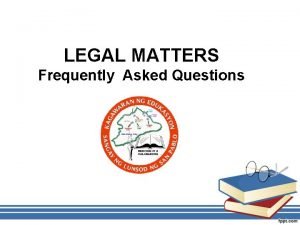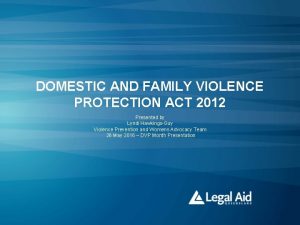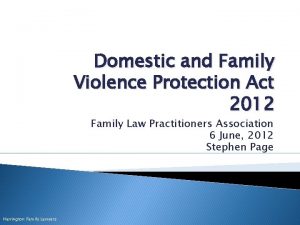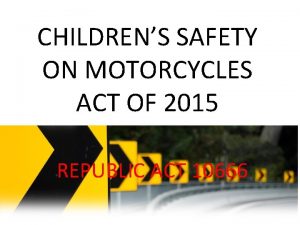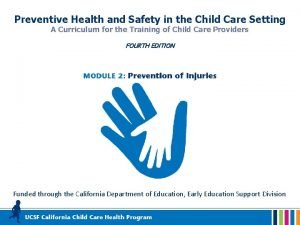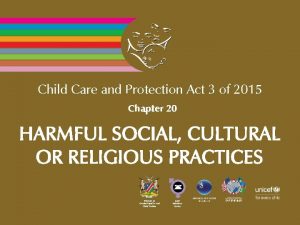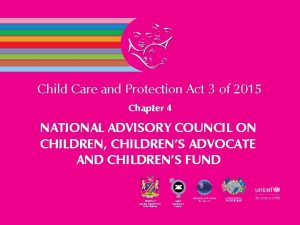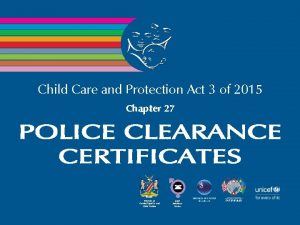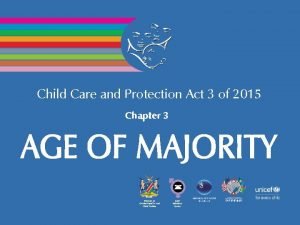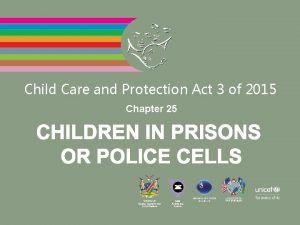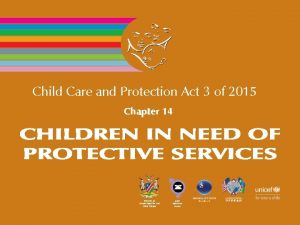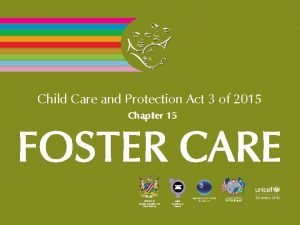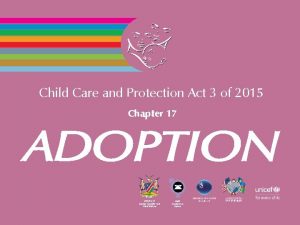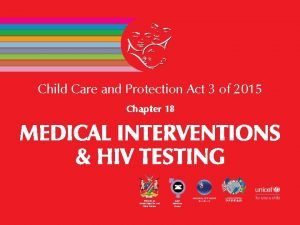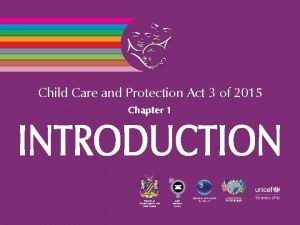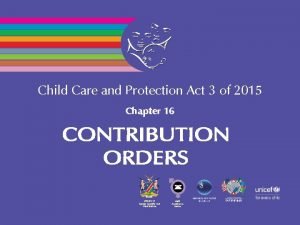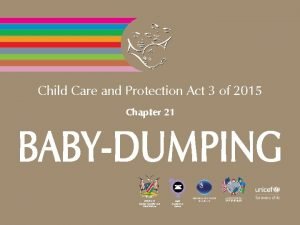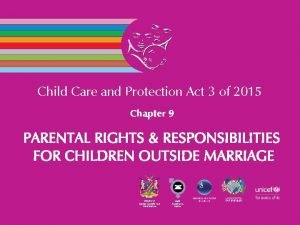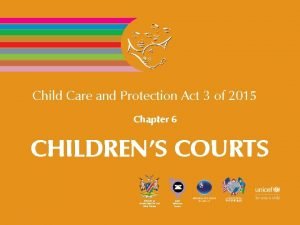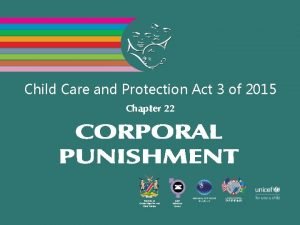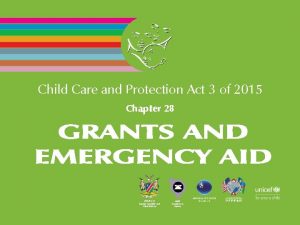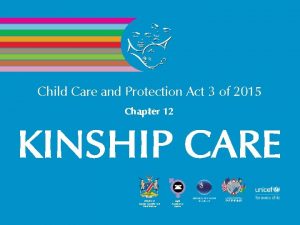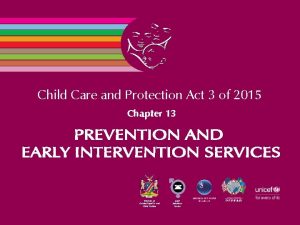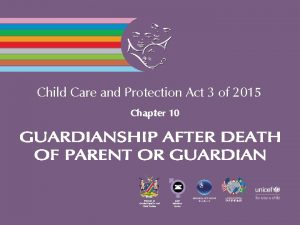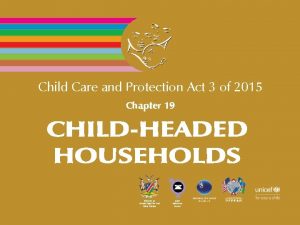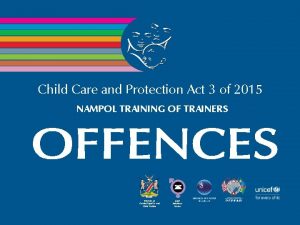Child Care and Protection Act 3 of 2015





























- Slides: 29

Child Care and Protection Act 3 of 2015 Chapter 2 OBJECTIVES AND GUIDING PRINCIPLES Ministry of Gender Equality and Child Welfare Legal Assistance Centre

Overview The Child Care and Protection Act is a child-centred law. l Children are persons, not objects. l Children have a right to participate in decisions that will l l affect them. Children’s dignity must be respected. Children must be protected against harm and discrimination. If children are treated withrespect, they are more likely to grow up to treat others with respect. Both children and their parents haverights and responsibilities.

1. Objects of Act The objectives of the CCPA are: l To protect and promote the well-being of all children l To give effect to children’s rights in the Namibian Constitution l To implement international agreements l To promote protection of families and involve them in resolving problems

● To strengthen and develop community structures ● To establish, promote and co-ordinate services and facilities for the care & protection of children ● To provide protective services ● To protect children from discrimination, exploitation and other harms ● To ensure that children are not discriminated against because of their parents’ marital status ● To recognise the special needs of children with disabilities or chronic illnesses

2. Best interest standard The best interests of the child is the most important consideration in a ll matters concerning children.

Best interests of the child Consider factors listed in the Act to identify the best interests of an individual child. Consider factors appropriate to the situation when a state action may affect children in general.

Best interests of an individual child: Factors to consider “Best interests of the child” will always depend on a child’s individual circumstances. ● The Act provides a list of factors to be considered in each case. ● The list of factors ensures that decision makers apply their minds fully to the child’s situation. ● The Act says that all of the listed factors must be taken into consideration where they are relevant.

Factors to consider child’s age, maturity and stage of development child’s sex child’s background child’s other personal characteristics child’s physical security child’s emotional security child’s intellectual, emotional, cultural and social development ● views of the child, in light of the child’s age, maturity and stage of development ● ● ● ●

● right of the child to know and be cared for by both parents (except where there is a risk of harm) ● relationship between the child and other significant persons in the child’s life ● attitude of the child’s mother and father towards the child & towards their parental responsibilities and rights ● capacity of the mother/father/care-giver to provide for the needs of the child ● desirability of keeping siblings together

l likely effect on the child of any change in circumstances, including a separation from: ● either or both parents ● a sibling or other child ● any other care-giver ● any other person the child has been living with l practical difficulty and expense of maintaining contact with parents l need to maintain connections with family, extended family, culture and tradition

l impact of any disability or chronic illness l l of the child importance of a stable family environment need to protect the child from physical or psychological harm need to minimise further legal and administrative procedures any other relevant factor.

Remember that children grow and change. Arrangements for children must often be flexible to take into account short-term and long-term needs.

2. 2 Paramount consideration The best interests of the child standard: l Convention on the Rights of the Child o “a primary consideration” (Art 3(1)) l African Charter on the Rights and Welfare of the Child o “the primary consideration” (Art 4(1)) l Child Care and Protection Act o “the paramount consideration” (s. 3(1)) None of these wordings makes the best interests of the child absolute. The child’s best interests must be treated as a particularly high priority, as weighed against the competing rights of others.

2. 3 Matters arising under the Act l Matters “concerning” a child include matters that affect a child directly or indirectly. l Matters “arising under the Act” cover actions by any person who is given powers or duties in terms of the Act. The best interests standard applies to “all matters concerning the care, protection and well-being of a child” arising under the Act.

2. 4 Proceedings, actions and decisions by “organs of state” “Organ of state” is defined in the Act to include: ● any office, ministry or agency of the State ● any administration in local or regional government ● any other functionary or institution exercising a power or performing a function in terms of the Namibian Constitution or any law. A government school IS an “organ of state”. The term does NOT include a court or a judicial officer. The best interests standard applies to “any proceedings, actions and decisions by an organ of state in any matter concerning a child or children”.

2. 5 Best interests in action 1) A substantive right: Best interests to be assessed and treated as the paramount consideration in decisions concerning a child. 2) A principle of interpretation: If a legal rule can be interpreted in more than one way, interpret it in the way that serves the child’s best interest. 3) A rule of procedure: The decision-making process must respect and consider the child’s best interests.

3. Child participation 3. 1 Right to participate

Age, maturity and stage of development The Act bases the right of participation on the child’s “age, maturity and stage of development”, instead of providing a specific age for the right to participation. This is because different children mature at different stages. ● Age: not decisive on its own ● Maturity: ability to understand assess implications of a matter or a decision ● Stage of development: degree of physical, cognitive and social growth Every child who is able to express meaningful views should have opportunity to do so. Research shows that even very young children and children with profound learning difficulties are capable of expressing meaningful views.

Due consideration The Act says that the child’s views must be given “due consideration”. ● Child’s view must be seriously considered ● Decision-maker can take child’s age, maturity and development into account ● Decision-maker should consider child’s grasp of the issues concerned

3. 2 Right NOT to participate Every child has the right to choose NOT to participate in a matter affecting the child. But the child must be given sufficient information about the matter to make a decision on participation which is in his or her best interests.

3. 3 Principles of child participation The Act contains five principles to guide child participation: Protection against victimisation Information about context Information about outcome Opportunity to complain Measures to overcome barriers

4. General principles These principles must guide implementation of the Act. Principle 1: Respect, protect and promote fundamental rights and freedoms & child’s best interests Principle 8: Resolve matters concerning the children in a nonconflictual way Principle 2: Respect the child’s dignity Principle 5: Recognise child’s need for development and play Principle 9: Avoid delays as far as possible Principle 3: Treat all children fairly and equitably Principle 4: Protect children against direct or indirect discrimination Principle 6: Respond to any special needs relating to child’s disability or chronic illness Principle 7: Give child’s parents / caregivers opportunity to express their views in matters concerning the child Principle 10: Inform children and parents of matters which could substantially affect the child

5. Children’s rights and responsibilities 5. 1 Children’s rights Children have a right to the basic living conditions necessary for development. It is every parent’s duty to provide these, in light of the parent’s abilities & financial capacities.

Other children’s rights Children have many other rights under the Namibian Constitution and international agreements joined by Namibia: ● Right to know and be cared for by parents (if in the child’s best interests) ● Right to name & nationality ● Right to protection ● Right to non-discrimination ● Right to participate in decisions made about them ● and many more ….

5. 2 Children’s responsibilities Children also have specific responsibilities (in light of their age, maturity, stage of development & ability): l Duty to family ● respect rights of family members ● assist them in times of need l Duty to community ● respect rights of community members ● serve community ● preserve & strengthen positive cultural values l Duty to nation ● respect rights of all persons in Namibia ● serve nation ● preserve & strengthen national solidarity l Duty to society ● contribute to moral well-being of society Duties based on African Charter on the Rights and Welfare of the Child, Article 31

6. Parental rights and responsibilities 6. 1 Key parental responsibilities l Duty to act in child’s best interests ● Best interests = paramount concern l Duty to guide and direct child ● Guidance should be consistent with child’s evolving capacities l Duty to protect child ● Protection from neglect, discrimination, violence, abuse & harm l Duty to make sure the child receives proper care ● Care by a competent person when parent is temporarily absent l Duty to provide basic living conditions necessary for child’s development ● In light of parent’s abilities and financial capacities

6. 2 Key parental rights l Right to control and administer the child’s property and property interests l Right to represent the child in legal proceedings l Right to maintain contact with the child, if in the child’s best interests l Right to give or refuse consents required by law in respect of the child

7. Children with disabilities The Act aims to promote social integration, development, self-reliance and active community participation for children with disabilities: l respect dignity of children with disabilities l provide appropriate care and protection l access to inclusive and non-discriminatory education, training & preparation for employment l access to health care services, support services & rehabilitation services l access to recreation opportunities

Children with disabilities: Article 23 of the Convention on the Rights of the Child provides that “a mentally or physically disabled child should enjoy a full and decent life, in conditions which ensure dignity, promote self-reliance and facilitate the child’s active participation in the community. ” According to the General Comment on this Article, “The core message of this paragraph is that children with disabilities should be included in society. ” ***
 Child care and protection act 3 of 2015
Child care and protection act 3 of 2015 Children rights and responsibilities
Children rights and responsibilities Child protection and toy safety act
Child protection and toy safety act Child protection reform amendment act 2017
Child protection reform amendment act 2017 Cncp and ccl
Cncp and ccl Data protection act in health and social care settings
Data protection act in health and social care settings Section 47 report
Section 47 report Safeguarding and child protection the essentials
Safeguarding and child protection the essentials Primary secondary tertiary medical care
Primary secondary tertiary medical care Courage child protection
Courage child protection Opinyon tungkol sa child protection policy
Opinyon tungkol sa child protection policy Child marriage definition
Child marriage definition Child protection case management tools
Child protection case management tools Types of child protection
Types of child protection Professional curiosity munro
Professional curiosity munro Community based child protection mechanisms
Community based child protection mechanisms Child protection training materials
Child protection training materials Child protection awareness training
Child protection awareness training Child protection minimum standards
Child protection minimum standards Child protection policy in schools example
Child protection policy in schools example Affidavit of two disinterested person
Affidavit of two disinterested person Act 1 act 2 act 3
Act 1 act 2 act 3 Domestic and family violence protection act 2012
Domestic and family violence protection act 2012 Domestic and family violence protection act 2012
Domestic and family violence protection act 2012 Left child right sibling tree
Left child right sibling tree Children’s safety on motorcycles act of 2015?
Children’s safety on motorcycles act of 2015? Travel prevention act of 2015
Travel prevention act of 2015 Fiji companies act 2015
Fiji companies act 2015 Child care facility rules and regulations answers
Child care facility rules and regulations answers Preventive health and safety in the child care setting
Preventive health and safety in the child care setting

